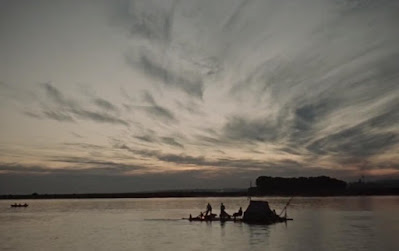Skip to main content
Cult Cinema: True Friends (1954) - Reviewed
 |
| Courtesy of Mosfilm |
Alexander (Aleksandr Borisov), Boris (Boris Chizhov) and
Vasily (Vasili Merkuryev) are three lifelong best friends stemming back from
their rambunctious childhood (shown in flashback) who since reaching adulthood
can barely find the time to hang out anymore.
To remedy this, they embark on a sojourn across the Yauza river on a
raft which becomes the focal point of the movie, driving their episodic
misadventures forward as they bump into one comical mishap after another which
both tests and strengthens their bonds of friendship. The resulting movie is partially a screwball
comedy, partially a thrilling action adventure in some scenes, partially a
musical and partially a nonjudgmental observation of how the populace of Russia
as a society behaved in the wake of Stalin’s death.
Charming and picturesque with director Kalatazov and his
cinematographer Mark Magidson’s trademark lush color cinematography and use of
Dutch angles, True Friends is a delightful little number sure to put
viewers in a good mood with its infectious humor and subtle use of drama. Sporting an arresting if not bright and
cheery score by Tikhon Khrennikov, the film has the rhythm of a Paul Thomas
Anderson movie, feeling off the wall and kind of screwy with how it segues from
anecdote to anecdote thanks to sharp editing by Ballad of a Soldier editor
Mariya Timofeyeva. The ensemble cast of
the three main characters more or less playing a variation of their comic
personas is generally solid though the real star of this cheerful endeavor is the
distinguished and confident director.
Going on to become the seventh highest-grossing Soviet film
of the year, the film enjoyed accolades including but not limited to the
Crystal Globe from the Karlovy Vary International Film Festival as well as a
certain amount of American attention. While
some American critics contested the so-called ‘cultural Thaw’ didn’t get much
traction with True Friends, on its terms it is a silly and enjoyable
little comedy made by one of Russia’s finest and most wholly original craftsmen. Though his next film The Cranes Are Flying
returned the director to serious minded fare with his WWII romantic drama
garnering the coveted Palme d’Or at Cannes, True Friends remains an
indelible outlier in the director’s illustrious career and is one of the
sweetest Russian comedies of its day. Not
on par with what he would do afterwards but a good solid mood lifter pretty
much anyone can get into.
--Andrew Kotwicki





